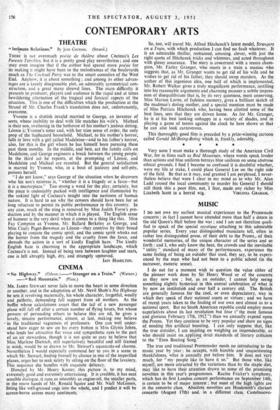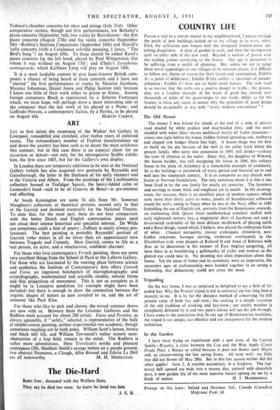MUSIC
I DO not owe my earliest musical experiences to the Promenade concerts ; in fact I cannot have attended more than half a dozen in the old Queen's Hall before the war ; and I am not therefore quali- fied to speak of the special mystique attaching to this admirable popular series. Every year distinguished musicians tell, often in rather less distinguished prose, of their debt to the Proms.,-of their wonderful memories, of the uniqiie character of the series and so forth ; and I, who only know the heat, the crowds and the inevitable " utility " standard of many of the performances, experience the same feeling of being, an outsider that used, they say, to be experi- enced by the man who had not been to a public schciol (in the narrower, esoteric sense). '
I do not for a moment wish to question the value either of the pioneer work done by Sir Henry Wood or of the concerts as they now are ; but, as an outsider, I cannot help seeing something slightly hysterical in this annual celebration of what is by now an institution and over half a century old. The British are generally famous for the cool, or even depreciatory, way in which they speak of their national assets or virtues ; and we have' of recent years taken to the fouling of our own nest almost as to a national sport. But no South American republic could employ more superlatives about its last revolution but four (" the most famous and glorious February' 17th, 1912 ") than we annually expend upon the Proms. Yet they continue to be very popular and show no signs of needing this artificial boosting. I can only 'suppose that, like the true outsider, I am insisting on weighing an imponderable, as who should insist on_applying strict standards of literary criticism to the " Eton Boating Song."
The true and traditional Promenader needs no introducing to the music year by year ; he accepts, with humble and unquestioning thankfulness, what is annually put before him. It does not vary much, for " my people like to have it so." But those who, like myself, are more attracted by the variations than by the staple diet, may like to have their attention drawn to some of the promising novelties in this year's programmes. Racine Fricker's symphony, which has its first London concert performance on September 14th, is certain to be of major interest ; but most of the high lights are in the concerto class. Absolute novelties are Hindemith's clarinet concerto (August 17th) and. in a different class. Castelnuovo- Tedesco's chamber concerto for oboe and strings (July 31st). Other comparative rarities, though not first performances, are Berkeley's piano concerto (September 3rd), two works by Rawsthorne—the first piano concerto (August 27th) and the violin concerto (September 5th)—Rubbra's Sinfonia Concertante (September 18th) and Murrill's 'cello concerto (with a Catalonian sub-title meaning, I fancy, " The Bird's Song ") on August 10th. To these should be added Ravel's piano concerto for the left hand, played by Paul Wittgenstein (for whom it was written) on August 13th ; and d'Indy's Synzphonie montagnarde, which Kathleen Long will play on August 18th. ,
It is a most laudable custom to give lesser-known British com- posers a chance of being heard at these concerts and I have not "starred " the first performances of works by Maurice Jacobson, Maurice Johnstone, Daniel Jones and Philip Sainton only because I know too little of their work either to praise or blaine. Among foreign composers Bloch is represented by a Scherzo Fantasque which, we must hope, will perhaps show a more interesting side of the composer than the last work of his played at a Prom.; and Goff redo Petrassi, a contemporary Italian, by a Partite, to be played































 Previous page
Previous page